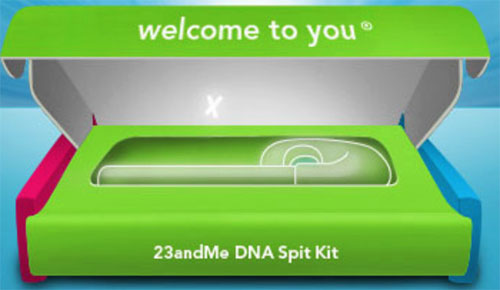|
Andrew Conrad, molecular biologist and lead researcher for Google X has been behind the latest push by the tech corporation to get to know their users better - by collecting data on DNA in order to decipher what a healthy, normal human being should look like.
If Google X could analyze the DNA of enough participants, it is suspected that "prevention based treatment strategies" would allow for the possible removal of traits that cause those diseases such as heart disease, diabetes, cancer and neurological disorders.
As a side project, Google Ventures has invested $161 million into 23andMe, a home genetics test that identifies mutations in the genome that can be removed if desired.
The sample taken from the saliva would be run through a gene chip provided by Illumina for deciphering of genetic ancestry and information on genetic risks, propensities and "mutations" that could lead to disease during the individual's lifetime.
According to the patent:
Indeed, the clients can peruse a "shopping list" of genetic traits that can be enhanced or suppressed such as:
Anne Wojcicki, former wife of Google founder Sergey Brin, said:
Google X has been developing animal-inspired robots, self-driving cars and even "smart" contact lenses (below video):
Conrad explained:
The Google Baseline Study project (BSP) is a ginormous genetic and molecular collection of "anonymous" from 175 participants. It is hoped that this number will grow to help create,
Conrad's team consists of 70 to 100 biologists, biochemists and experts in imaging, physiology and molecular biology in order to increase our understanding of disease in the human body.
Conrad said:
Duke University (DU) and Stanford University (SU) and other academia are collaborating with Google X to identify,
Earlier this month, Alcon, the eye care company for the Swedish pharmaceutical Novartis, obtained licensed technology for a "smart lens" from Google X.
The two corporations are focused on assisting diabetics with a smart lens that will,
Brian Otis and Babak Parviz, founder of the smart lens project for Google X, explained:
Google X said:
The lens is bordered with sensors and microchips that could attempt to correct vision problems for patients with presbyopia via an autofocus capability.
Research for this device began several years ago with the University of Washington (UoW) and the National Science Foundation (NSF) who invested funding. Beta-testing of the lens was conducted on volunteers in in the San Francisco Bay area.
Concerning U.S. regulators, Google said:
|


